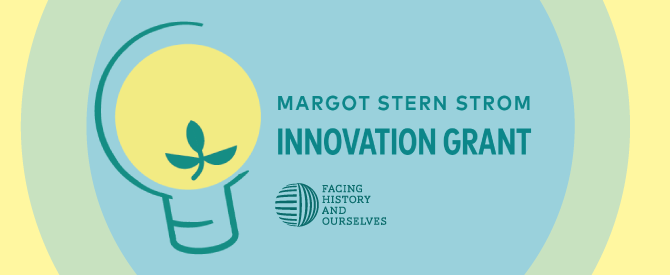
We're proud to announce the 12 recipients of the 2017 Margot Stern Strom Innovation Grants! This year, we asked teachers to send us their best ideas for how to make "hard empathy" a tangible, concrete experience for young people in the classroom—and they delivered! We received 129 inspiring ideas, which made it difficult for us to choose only 12.
Each educator submitted a two-minute video for the chance to win $2,500 to bring their project to life. This year's winners offer a diverse range of strategies, perspectives, and angles for making empathy a central theme in the classroom. Check out a few of the winning projects below and make sure to explore them all along with the 23 honorable mentions!
Jackson Westenskow, High Point Academy - Aurora, Colorado
 This project proposes the use of a simple game known as “Empathy Builders” to help students understand the concept of empathy. By using game-based learning, students can experience a real example of empathy, teachers can identify that moment, and then students can extend their learning through application to other authentic situations. The game can spark conversations about empathy to build a common ground of understanding among peers.
This project proposes the use of a simple game known as “Empathy Builders” to help students understand the concept of empathy. By using game-based learning, students can experience a real example of empathy, teachers can identify that moment, and then students can extend their learning through application to other authentic situations. The game can spark conversations about empathy to build a common ground of understanding among peers.
Michael Davies, Lancaster Royal Grammar School - Lancaster, United Kingdom
 To help educators teach controversial subjects, like the history of Israel and Palestine, this project uses interactive video lessons to tell two parallel narratives. Students are divided into two groups to listen to each narrative and are then brought together to answer increasingly difficult questions about causality, responsibility, and credibility, while forcing them to examine how they absorb and process conflicting viewpoints.
To help educators teach controversial subjects, like the history of Israel and Palestine, this project uses interactive video lessons to tell two parallel narratives. Students are divided into two groups to listen to each narrative and are then brought together to answer increasingly difficult questions about causality, responsibility, and credibility, while forcing them to examine how they absorb and process conflicting viewpoints.
Catherine Epstein, Meridian Academy - Jamaica Plain, Massachusetts
 This project creates tangible engagement between students on different ends of the political spectrum by exchanging letters with each other over the course of one school year. The letters are meant to humanize one another through an ongoing correspondence about both their daily lives and their perspectives on the world. This will cultivate a long-term dialogue between students who might not otherwise thoughtfully engage with one another and can help them come to a more nuanced understanding about political difference.
This project creates tangible engagement between students on different ends of the political spectrum by exchanging letters with each other over the course of one school year. The letters are meant to humanize one another through an ongoing correspondence about both their daily lives and their perspectives on the world. This will cultivate a long-term dialogue between students who might not otherwise thoughtfully engage with one another and can help them come to a more nuanced understanding about political difference.
Stay tuned this fall to see which two of these 12 projects are chosen to receive $2,500 in additional funding to promote their project with Facing History and Ourselves.


